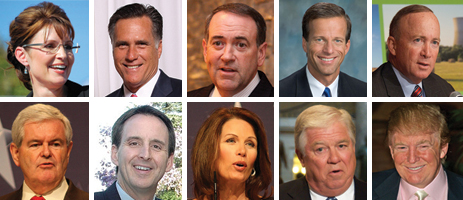We’ve checked out the leading (or at least famous) hopefuls for the Republican presidential nomination and found that all of them vociferously oppose cap-and-trade systems — including a few who had to flip-flop to get there. (They’re not fans of cap without trade either, nor other policies designed to cut greenhouse gas emissions.) On climate science, there’s more variety, ranging from loud denial to quiet acquiescence. Get the dirt on the possible candidates here.
Did we miss anything notable? Tell us in comments below.
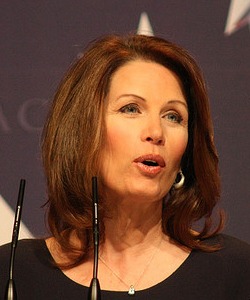 Photo: Gage SkidmoreMichele Bachmann
Photo: Gage SkidmoreMichele Bachmann
U.S. rep from Minnesota
Increasingly seen as Palin-without-the-baggage, Bachmann loves to wind up Tea Partiers with anti–climate science, anti-cap-and-trade rants.
On climate science: Here’s Bachmann on global warming in 2008: “It’s all voodoo, nonsense, hokum, a hoax.” (We’re sensing some skepticism.) In 2009, she claimed there’s no need to worry about carbon dioxide because it’s a “natural byproduct of nature,” going on to say, “There isn’t even one study that can be produced that shows that carbon dioxide is a harmful gas.”
On climate policy: “The tax cap-and-trade system for limiting emissions is just another tax on businesses,” she said in ‘08. In 2009, she amped up the rhetoric: “I want people in Minnesota armed and dangerous on this issue of the energy tax because we need to fight back.” She later clarified that she didn’t really mean guns; she just wants citizens “to be armed with knowledge, so they can be dangerous to the policies of the left.”
Bonus fruitloopery: According to Bachmann, Jesus already saved the planet, so the rest of us don’t need to; an Alaskan pipeline has become a meeting place and “coffee klatch” for caribou; and the Arctic National Wildlife Refuge is “the most perfect place on the planet to drill.”
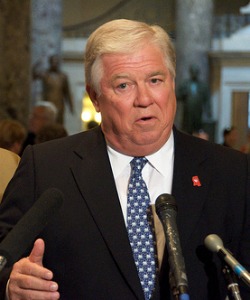 Photo: Republican ConferenceHaley Barbour [UPDATED: NOT RUNNING]
Photo: Republican ConferenceHaley Barbour [UPDATED: NOT RUNNING]
Governor of Mississippi
[UPDATE: Barbour announced on April 25, 2011 that he will not be running for president.]
Barbour has a history of obstructing climate action (little known fact: he was the lobbyist behind George W. Bush’s fateful early decision not to regulate CO2), but these days he’s trying to sound more moderate.
On climate science: Barbour “challenged climate science during his past tenure as an oil industry lobbyist and chairman of the Republican National Committee,” Politico reports.
More recently, Barbour has talked about reducing greenhouse gases but still sounded not entirely convinced by the science. In 2009, while testifying before the Senate about cap-and-trade, he said, “the reason I am here is that we do need to look at how best, in the best interests of the United States, and most effectively, to deal with the threat that scientists are saying CO2 has for the future of the climate.” And in 2010, in praising his state’s cleantech businesses, he said, “Whether you think climate change is manmade, whether you think it’s inevitable, whatever your view of it is, there’s things like we’re doing in our state that are good economics, that are useful and they will reduce greenhouse gas emissions.”
On climate policy: In 2001, Barbour sent a memo to the Bush administration arguing that it should drop plans to regulate carbon dioxide; shortly thereafter, it did.
In 2009, Barbour argued in The Washington Times that Obama’s cap-and-trade plan “will be the biggest tax increase in history and will clobber low- and middle-income families. … There are much better ways to address climate change and prudently reduce emissions here and around the world.” (He hasn’t elaborated on those better ways.)
Over the past year, Barbour has also been rallying governors to fight the EPA’s efforts to regulate greenhouse gases.
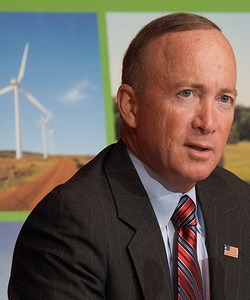 Photo: Republican ConferenceMitch Daniels [UPDATED: NOT RUNNING]
Photo: Republican ConferenceMitch Daniels [UPDATED: NOT RUNNING]
Governor of Indiana
[UPDATE: Daniels announced on May 21, 2011 that he will not be running for president.]
Daniels hasn’t out and out denied climate science, but he’s made no bones about his skepticism, nor about his opposition to cap-and-trade.
On climate science: In May 2009, Daniels suggested that cutting carbon dioxide emissions might not be the worst idea in the world. “[Indiana has] embarked on an aggressive energy-conservation program, indubitably the most cost-effective means of limiting CO2,” he wrote.
But just a couple of weeks later during a commencement address, he slammed what he called the “climate change theocracy,” claiming that discussion of climate science has been dominated by “the University of Hollywood and the P.C. Institute of Technology” and quoting at length from climate skeptic and sci-fi author Michael Crichton.
And in April 2010, apparently in response to “Climategate,” he said, “There’s been nothing but dubious news about the science on this for about a year.”
On climate policy: In an op-ed in The Wall Street Journal in May 2009, he bashed the Waxman-Markey climate and energy bill in the House, saying it “looks like imperialism” and would “double electricity bills in Indiana” and send jobs to China. “This bill would impose enormous taxes and restrictions on free commerce by wealthy but faltering powers — California, Massachusetts and New York — seeking to exploit pol
itically weaker colonies in order to prop up their own decaying economies,” he wrote.
Read more on Daniels and climate.
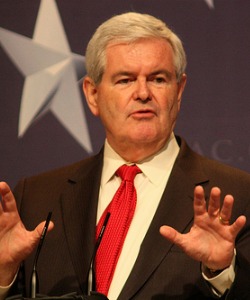 Photo: Gage SkidmoreNewt Gingrich
Photo: Gage SkidmoreNewt Gingrich
Former speaker of the House
Gingrich has been all over the map on climate. A few years ago, he endorsed cap-and-trade and called for climate action in an ad for an Al Gore group, but these days he sticks close to GOP orthodoxy.
On climate science: In 2007, Gingrich said, “the evidence is sufficient that we should move towards the most effective possible steps to reduce carbon-loading of the atmosphere … and do it urgently.” And in a 2008 ad for Al Gore’s Alliance for Climate Protection, he sat next to then-Speaker Nancy Pelosi and said, “our country must take action to address climate change.”
But he has since reversed course. In his 2010 book To Save America: Stopping Obama’s Secular-Socialist Machine, Gingrich decried “the doomsday theory of climate change,” which he attributed to the “high-tax, big-bureaucracy, job-killing, and government-centralizing environmentalism of the Left.”
And in a 2010 interview with Grist, he said, “It’s an act of egotism for humans to think we’re a primary source of climate change.”
On climate policy: In 2007, Gingrich praised the cap-and-trade concept: “I think if you have mandatory carbon caps combined with a trading system, much like we did with sulfur, and if you have a tax-incentive program for investing in the solutions, that there’s a package there that’s very, very good. And frankly, it’s something I would strongly support.”
But in 2008, in his book Drill Here, Drill Now, Pay Less, he argued that cap-and-trade would “increase corruption.” And in 2009 and 2010, he was a vocal opponent of cap-and-trade proposals in Congress, saying they were “an energy tax” that would “punish the American people” with higher energy costs and lost jobs. His group American Solutions for Winning the Future also made a big push to kill climate legislation.
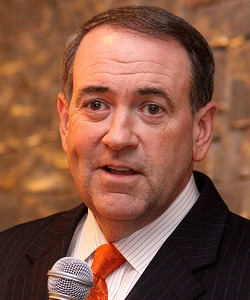 Photo: Gage SkidmoreMike Huckabee [UPDATED: NOT RUNNING]
Photo: Gage SkidmoreMike Huckabee [UPDATED: NOT RUNNING]
Former Arkansas governor and 2008 presidential contender
[UPDATE: Huckabee announced on May 14, 2011 that he will not be running for president.]
Huckabee is squishy on climate science and appears to have flip-flopped on cap-and-trade.
On climate science: In 2007, Grist asked Huckabee, “Do you believe that human beings are the primary drivers of climate change?” He replied, “The honest answer is I don’t know. And for me, that’s not the issue. Instead of being wrapped into this political discussion of, ‘Is there global warming, and who caused it?,’ what we need to be saying is, ‘Look, let’s agree that we all have responsibility to present a better planet to the next generation.’ … Being a conservationist is the proper way to live, whether there is human-based global warming or not.”
Huckabee seems to hold the same view — whatever it is — today.
On climate policy: On cap-and-trade, though, Huckabee has changed his tune. At a climate conference in 2007, he said, “I also support cap-and-trade of carbon emissions. And I was disappointed that the Senate rejected a carbon-counting system to measure the sources of emissions, because that would have been the first and the most important step toward implementing true cap-and-trade.”
But in December 2010, Huckabee claimed he has only ever supported voluntary cap-and-trade. “This kind of mandatory energy policy would have a horrible impact on this nation’s job market. I never did support and never would support it — period,” he said.
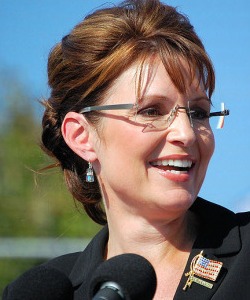 Photo: Therealbs2002Sarah Palin
Photo: Therealbs2002Sarah Palin
Former Alaska governor and 2008 vice presidential nominee
Palin tried to moderate her climate skepticism when she was on the ticket with John McCain, but once they lost the election, she let her denialism flag fly.
On climate science: Just before John McCain tapped her to be his running mate, Palin said, “I’m not one … who would attribute [global warming] to being man-made.”
Just after she was picked, she told ABC’s Charlie Gibson, “I believe that man’s activities certainly can be contributing to the issue of global warming, climate change. … Regardless, though, of the reason for climate change, whether it’s entirely, wholly caused by man’s activities or is part of the cyclical nature of our planet — the warming and the cooling trends — regardless of that, John McCain and I agree that we gotta do something about it and we have to make sure that we’re doing all we can to cut down on pollution.”
These days, she’s more inclined to call climate research “snake oil science.”
On climate policy: In her 2009 book Going Rogue, Palin criticized “Washington’s misguided ‘Cap and Trade’ plan,” writing, “let’s call it what it is: a ‘Cap and Tax’ program. … As more and more Americans understand that cap and trade is an environmentalist Ponzi scheme in which only the government benefits, they will refuse to tolerate it.”
In October 2010, she wrote on her Facebook page, “I’ve made no secret of the fact that I think cap-and-tax could potentially be more disastrous to our economy than Obamacare because it would devastate our businesses and cripple our energy and industrial sectors.”
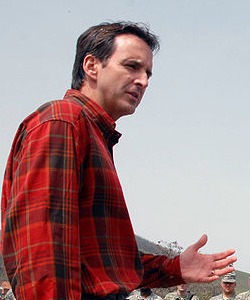 Photo: Jim Greenhill
Photo: Jim Greenhill
Tim Pawlenty [UPDATED: NOT RUNNING]
Former governor of Minnesota
[UPDATE: Pawlenty announced on Aug. 14, 2011 that he was quitting the race for president.]
Pawlenty used to be a champion of moderate climate action, but he’s changed his tune in the last couple of years. (We sense a theme.)
On climate science: In 2007, while announcing a new state climate commission, he said, “our global climate is warming, at least in part due to the energy sources we use.”
But by 2010, Pawlenty was emphasizing uncertainty rather than warming. “The climate’s obviously changing,” he said on Meet the Press. “But the real question and the more interesting question is how much of that is manmade, how much of that is the result of natural causes and patterns? And, of course, we’ve seen a lot of data manipulation and a lot of controversy or at least debate within the scientific community.”
On climate policy: In 2007, Pawlenty signed his state up for the Midwestern Greenhouse Gas Reduction Accord, a regional cap-and-trade system, and signed a bill requiring that 25 percent of Minnesota’s electricity come from renewable sources by 2025. In 2008, he (unsuccessfully) pushed a climate initiative while he was chair of the National Governors Association, and gave a speech calling for climate action at the Pew Center on Global Climate Change.
“I support a reasonable cap-and-trade system,” Pawlenty said in 2008, when he was gunning for the VP slot on McCain’s ticket. “I think it’d be good for the federal government to take that up rather than have states take it up as clusters of regions.”
But two years later, he changed his tune: “[W]e should all be in favor of reducing pollution. But we need to do that in ways that don’t burden the economy. Cap-and-trade, I think, would be a disaster in that regard,” he said on Meet the Press.
Pawlenty spokesperson Alex Conant explained the switch: “Gov. Pawlenty and many others considered cap-and-trade approaches, but concluded it’s the wrong approach and doesn’t support it. Over the last couple of years he has fought to stop the Democrats’ cap-and-trade proposals because they’re bureaucratic, clumsy and hurt the economy.”
UPDATE, 2/15/11: At the CPAC conference in February 2011, Pawlenty walked back even further from his previous support for cap-and-trade: “Have I changed my position? Yes. But I’m not going to be cute about it, hem and haw, be dippy and dancy about it. Just saying yeah, it was a mistake, it was stupid. It was wrong.”
UPDATE, 4/22/11: Mother Jones reports on how Pawlenty had worked closely with Arctic explorer Will Steger to raise awareness of climate change, but then abruptly stopped collaborating in 2008 when his national profile started to rise. Steger says he’s “baffled” by Pawlenty’s change of position on climate change.
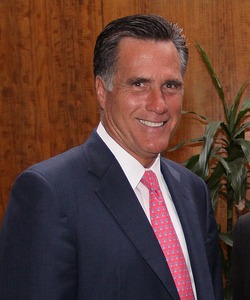 Photo: World Affairs Council of PhiladelphiaMitt Romney [UPDATED]
Photo: World Affairs Council of PhiladelphiaMitt Romney [UPDATED]
Former Massachusetts governor and 2008 presidential contender
Romney acknowledges that climate change is real and at least partially human-driven, but don’t go thinkin’ he likes cap-and-trade — at least not any more.
On climate science: “I believe that climate change is occurring — the reduction in the size of global ice caps is hard to ignore. I also believe that human activity is a contributing factor,” Romney wrote in his 2010 book No Apology: The Case for American Greatness.
[UPDATE, 6/3/11: At a Town Hall meeting in New Hampshire on June 3, 2011, Romney affirmed his belief that climate change is real and we need to do something about it: “I believe the world’s getting warmer. … I believe that humans contribute to that. … And so I think it’s important for us to reduce our emissions of pollutants and greenhouse gases that may well be significant contributors to the climate change and the global warming that you’re seeing.” As for how we ought to go about reducing those emissions, we’re still waiting …]
On climate policy: In a June 2010 statement, Romney said, “Cap and trade effectively constitutes an enormous, hidden tax on the American people and American businesses. It will lead to higher joblessness and make a bad economic situation even worse. And because it will simply move greenhouse gas emitters from America to other nations like China, it won’t do a thing to affect climate change.”
It would appear he didn’t always feel that way. In 2005, when he was governor of Massachusetts, Romney pulled his state out of a soon-to-launch cap-and-trade system for Northeast states, the Regional Greenhouse Gas Initiative, but only after his staffers spent two and a half years and almost half a million dollars helping to shape the pact, and after Romney praised the intiative as “good business.”
In 2004, Romney unveiled a Massachusetts Climate Protection Plan that aimed to reduce the state’s greenhouse gas emissions to 1990 levels by 2010 and then about 10 percent more by 2020, though it relied primarily on voluntary measures and requirements that applied only to the state government.
Read more about Romney — including how he once attacked coal jobs that “kill people.”
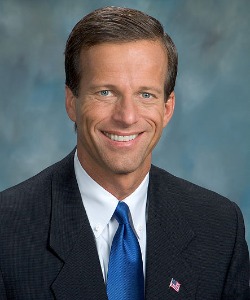 John Thune [UPDATED: NOT RUNNING]
John Thune [UPDATED: NOT RUNNING]
Senator from South Dakota
[UPDATE: Thune announced on Feb. 22, 2011 that he will not be running for president.]
Thune questions climate science and bashes cap-and-trade.
On climate science: When asked his views on the science, Thune said, “I guess the answer to the question is I’m not sure. I think there’s a real mix of data on that.”
On climate policy: Thune opposed cap-and-trade proposals in the Senate, claiming they would harm the agriculture sector and “destroy jobs, raise energy prices, disadvantage whole regions of the country such as the Midwest, do very little for the reducing greenhouse gases globally …, and greatly expand the regulatory reach of the federal bureaucracy.”
He also sent a letter to EPA chief Lisa Jackson objecting to EPA’s plans to regulate greenhouse gas emissions.
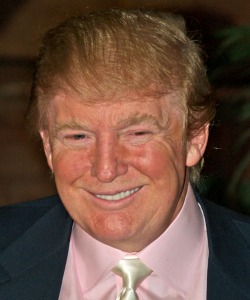 Photo: David ShankboneDonald Trump [UPDATED: NOT RUNNING]
Photo: David ShankboneDonald Trump [UPDATED: NOT RUNNING]
Reality TV host and real estate magnate
[UPDATE: Trump announced on May 16, 2011 that he will not be running for president.]
Trump is confused about climate change and condescending about climate action.
On climate science: In early 2010, Trump broadcast his climate denial in a speech to members of the Trump National Golf Club. “With the coldest winter ever recorded, with snow setting record levels up and down the coast, the Nobel committee should take the Nobel Prize back from Al Gore,” he said.
On climate policy: “Gore wants us to clean up our factories and plants in order to protect us from global warming, when China and other countries couldn’t care less,” Trump said in the same speech. “It would make us totally noncompetitive in the manufacturing world, and China, Japan, and India are laughing at America’s stupidity.”
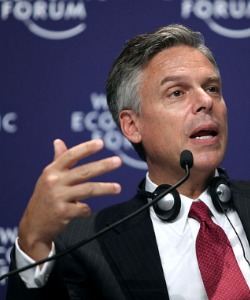 Photo: World Economic ForumJon Huntsman [UPDATED]
Photo: World Economic ForumJon Huntsman [UPDATED]
Former Utah governor and ambassador to China
Huntsman appears to take climate change seriously, making him perhaps the greenest GOP presidential contender — at least so far. [Well, see the update below …]
On climate science: Unlike his rivals, Huntsman has consistently spoken out about the threat of climate change and has not been inclined to waffle over whether it is primarily human-caused. In an October 2008 gubernatorial debate in Utah, Huntsman said, “carbon emission … is a problem because it leads to polluted skies and air-quality problems and climate change.” And in May 2011, he told Time that he is inclined to believe the overwhelming scientific consensus on climate change.
On climate policy: At that 2008 debate, Huntsman said, “we must put a value on carbon. Until we put a value on carbon, we’re never going to be able to get serious about dealing with climate change longer term. Now, putting a value on carbon either suggests that you go to a carbon tax or you get a cap-and-trade system underway.” He also argued that climate and clean-energy policy would boost Utah’s economy: “a very important engine of growth for us over the years will be the new innovations and technologies and capital equipment surrounding a new energy economy, a green energy economy — things like carbon capture and sequestration.”
In 2007, Huntsman appeared in an Environmental Defense Action Fund ad calling for Congress to cap greenhouse gases. In the absence of federal action, he pushed forward in his own state. He brought Utah into the Western Climate Initiative in 2007, and the next year, he set a goal for the state to reduce its greenhouse gas emissions to 2005 levels by 2020. In January 2009, he said he found it “enormously frustrating” that Republicans had not been working toward a national climate policy. As ambassador to China, Huntsman tried to promote joint American-Chinese climate solutions.
UPDATE, 5/12/11: In an interview with Time, Huntsman backtracked from his support for cap-and-trade, saying the Western Climate Initiative “hasn’t worked, and our economy’s in a different place than five years ago.” For now, “this isn’t the moment” to keep trying, he said. As the WCI’s cap-and-trade program hasn’t actually gone into effect yet, it’s hard to know how he determined that it “hasn’t worked.”
Read more on Huntsman and climate.
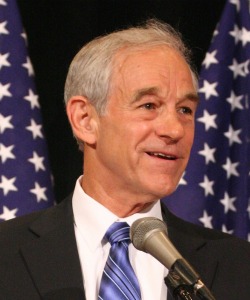 Photo: R. DeYoungRon Paul
Photo: R. DeYoungRon Paul
U.S. rep from Texas
Paul used to acknowledge that climate change might be a bit of a problem and might be at least slightly driven by human activity, but more recently he’s taken the Inhofe-ian view that it’s all a big ol’ hoax.
On climate science: In a 2007 interview with Grist, Paul said, “I think some of it [global warming] is related to human activities, but I don’t think there’s a conclusion yet.” In an interview with the Freakonomics guys in late 2008, Paul again raised questions about how much humans are to blame for changes in the climate, but acknowledged that “[c]learly there is something afoot” and “science shows that human activity probably does play a role in stimulating the current fluctuations.” He continued, “I think there are common-sense steps we can take to cut emissions and preserve our environment.”
But the next year, he sounded much more the skeptic: “there is no consensus in the scientific community that global warming is getting worse or that it is manmade,” he wrote, going on to cite a thoroughly debunked anti-climate-science petition. Then in an interview on Fox News on Nov. 4, 2009, Paul slid still furthe
r down the skeptic slope: “the greatest hoax I think that has been around for many, many years if not hundreds of years has been this hoax on the environment and global warming.”
On climate policy: Paul was firmly opposed to the cap-and-trade bill that passed the House in 2009; he warned that it would “put another nail in the economy’s coffin.” In May 2009, Paul signed the “No Climate Tax Pledge” promoted by the Koch brothers’ group Americans for Prosperity.
Paul’s proposed remedy for any problems with our energy system is eliminating all energy subsidies: “If oil were allowed to rise to its natural price, there would be tremendous market incentives to find alternate sources of energy,” he said in his Freakonomics interview.
Read more on Paul and climate. Also read Grist’s 2007 interview with Paul.
Haven’t gotten enough yet? Read up on long-shot contender Herman Cain, who’s also a climate denier — and who encourages you not to “snuff your seed.”

